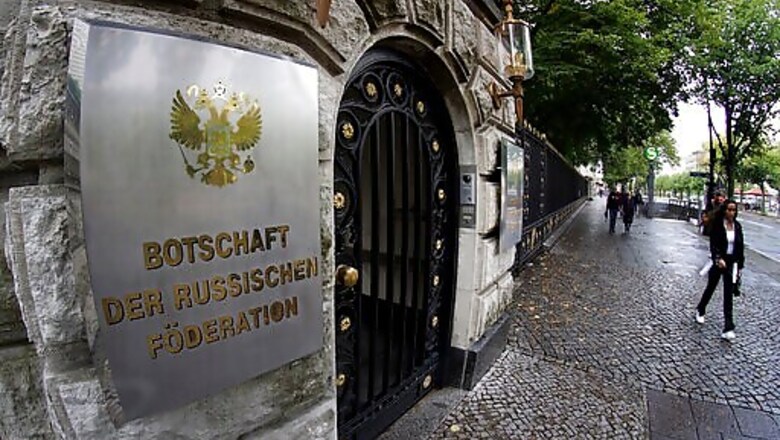
views
BERLIN: The German hospital treating Russian opposition leader Alexei Navalny says he has been taken out of an induced coma and is responsive.
German experts say Navalny, who fell ill Aug. 20 on a domestic flight in Russia, was poisoned with a substance belonging to the Soviet-era nerve agent Novichok.
Berlins Charite hospital said Monday that Navalnys condition has further improved, allowing doctors to end the medically induced coma and gradually ease him off mechanical ventilation.
It noted that he was responding to speech but long-term consequences of the serious poisoning can still not be ruled out.
THIS IS A BREAKING NEWS UPDATE. APs earlier story follows below.
BERLIN: German Chancellor Angela Merkel’s office indicated Monday that she might be willing to rethink the fate of a controversial German-Russian gas pipeline project a clear sign of Berlin’s growing frustration over Moscows stonewalling about the poisoning of Russian opposition leader Alexei Navalny,
Navalny, a fierce, high-profile critic of Russian President Vladimir Putin, was flown to Germany on Aug. 22, two days after falling ill on a domestic flight in Russia. German chemical weapons experts say tests show that the 44-year-old Navalny was poisoned with a Soviet-era nerve agent, prompting the German government last week to demand that Russia investigate the case.
Russia has denied that the Kremlin was involved in poisoning Navalny and accused Germany failing to provide evidence about the poisoning that it requested in late August.
German Foreign Minister Heiko Maas said Sunday that the Russian reaction could determine whether Germany changes its long-standing backing for the Nord Stream 2 pipeline, which brings Russian gas to Germany under the Baltic Sea, bypassing Ukraine.
The chancellor also believes that it’s wrong to rule anything out, Merkel spokesman Steffen Seibert told reporters after being asked about Maas’ comments.
Previously, Merkel had insisted on decoupling the Navalny case from the pipeline project, which the U.S. strongly opposes.
In August, three U.S. Republican senators threatened sanctions against the operator of a Baltic Sea port located in Merkels parliamentary constituency for its role as a staging post for ships involved in building Nord Stream 2.
Germany announced Wednesday that samples taken from Navalny showed clear evidence he was poisoned with substances from the Novichok group. Seibert cautioned that it was premature to expect Moscow to respond to the matter within a few days, but made it clear that Berlin wants answers soon.
I can’t express a clear, time-limited expectation, except that we are certainly not talking about months or the end of the year, he said.
German diplomats rejected the Russian suggestion that Berlin was to blame for any delay in investigating the case, noting that Navalny was first treated for suspected poisoning in the Siberian city of Omsk on Aug. 20.
All evidence, witnesses, traces and so forth are in the place where the crime was committed, presumably somewhere in Siberia, said German Foreign Ministry spokesman Christofer Burger.
The co-leader of Germany’s opposition Green party, Robert Habeck, called on the government to take a stronger stance and bury the pipeline project.
The project divides Europe, it is economically nonsensical and oversized, and it is wrong in security policy terms, Habeck said. Completing it would mean that Russia can do what it wants. This signal must not be sent.
Mikhail Ulyanov, the Russian envoy to international organizations in Vienna, voiced suspicions about the timing of demands to link the pipeline with Navalny.
Suspicious coincidence of Navalny case and the final stage of Nord Stream 2 construction, which some states desperately want to be closed. I am not fond of conspiracy theories but it is obvious that the tragic events with Navalny are very timely and helpful for opponents of NS2,” he tweeted.
___
Geir Moulson in Berlin and Vladimir Isachenkov in Moscow contributed to this report.
Disclaimer: This post has been auto-published from an agency feed without any modifications to the text and has not been reviewed by an editor




















Comments
0 comment